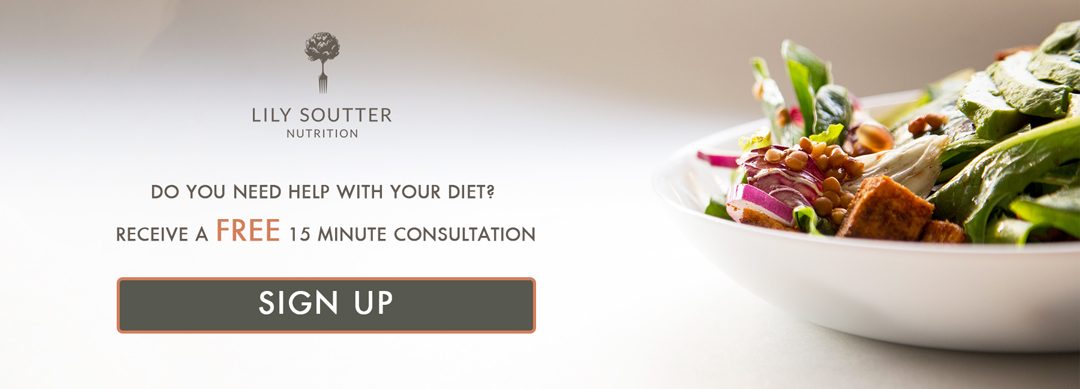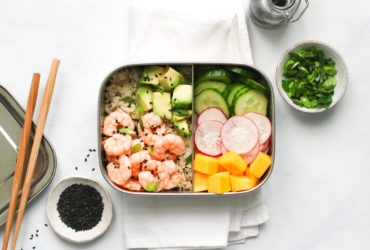Did you know that as many as 40% of people within the UK may have at least one digestive symptom at any one time? 1. Even for those of us who don’t, the festive season can be a challenge due to the abundance of parties and temptations to overindulge. I certainly don’t want to take the fun out of Christmas, food is there to be enjoyed as much as it is needed for nourishment, therefore I’ve rounded up easy 10 tricks to maintain a healthy gut this christmas without compromising on pleasure…
*If suffering from IBD & IBS, please consult with your GP before embarking on dietary changes.
1) Start your day the right way…
Overeating, especially with fat rich heavy meals can be a top cause for digestive complaint 2. Set yourself up for success by having a healthy but hearty breakfast – and don’t forget to include protein!
Research has shown that those who eat breakfast tend to have a more of a balanced diet, are less likely to snack unnecessarily.
One study has also shown that participants who consumed good quality protein at breakfast stayed ‘fuller for longer’, which in turn prevented overeating later on in the day 3.
Try:
- Scrambled eggs with tomatoes
- Porridge with seeds
- Natural yoghurt with fresh fruit
2) Learn the art of mindful eating
Sometime digestive relief comes from not what we eat, but the way we eat!
Meal times shouldn’t be a race to the finish line. Take your time to sit down and chew your food. Try to put your fork down between each bite. Savour the flavours and give your brain time to register your hunger and fullness cue 4.
3) Enjoy a drink…but choose wisely
Who doesn’t like a drink to two around the festive season?! Although it’s clear that alcohol can be a digestive irritant 5, you’ll be pleased to know that research suggests that light drinking (1 drink per day) shouldn’t affect digestive health 5. Binge drinking (4 drinks per day) however, may lead to digestive upset 5 and generally isn’t healthy all round.
1 drink = 1 regular beer, 1 small glass of wine, 1 small shot of spirit
To curb your intake try:
- Spritzers – add sparkling water to your wine
- Vodka or gin with sparkling water and a squeeze of fresh lemon or lime
- Seedlip – an alcohol free spirit
- Beetroot and red apple juice with a touch of cinnamon
- Infused water – berries, cucumber, mint, lemon, lime, ginger

4) Get inventive with your canapés and always line your stomach
When it comes to maintain a healthy gut health over christmas, one things for sure…don’t drink alcohol on an empty stomach!!
Try consuming a small meal or snack before Christmas parties to line your stomach. You can also experiment with homemade healthy canapés, meaning that you can snack away without the worry of piling on the pounds.
*Try hummus with crudités, unsalted spiced nuts, spiced chickpeas, stuffed mini mushrooms
5) Feed your gut with festive veg…
Did you know that we have trillions of healthy bacteria within our gut, microbiome. In fact they weigh around 2 kg, which is the same weight two as two bags of Brussels sprouts and outnumber our human cells by 10-1!!
Our friendly bacteria thrive on prebiotic fibre for fuel, and since many traditional Christmas foods tend to be low-fibre and high-fat, they’re not always very gut friendly.
Interestingly festive Brussel sprouts, cabbage and even parsnips are especially rich in this special prebiotic fibre, making them the perfect fuel to help our gut bacteria flourish & grow.
Not a fan? Try festive veg with a twist:
*Brussels sprout with pecans & grapes
*Red cabbage with orange zest & cinnamon
*Honey glazed parsnips
*For those suffering with IBS – consult with your GP before increasing consumption of prebiotic foods
6) Impress your guests with quirky festive foods
What better way to impress your guest than providing festive foods with health benefits.
Research suggests that regular consumption of fermented foods which are rich in good bacteria may help support digestive health 6. Get fermenting and you’ll bring a whole new talking point to the table!
- Sauerkraut – switch your usual boiled red cabbage, for sauerkraut. Still technically cabbage but fermented and with additional good bacteria.
- Live yoghurt – switch your brandy cream with a dollop full-fat natural yoghurt
- Pickles – who’d of thought that pickles are a source of probiotics! Try making canapes with naturally fermented pickles (not those in vinegar), some smoked salmon and wholegrain toast.
- Cheese – yep those blue streaks on our stilton are exactly what we thought they were – bacteria and mould!
- Kefir – traditionally a fermented milk drink, but you can now even make dairy-free kefir! Add a hint of nutmeg for a festive twist.
7) Don’t let Christmas stress get to you…
Although Christmas is a season of festive fun, for many it can also be relatively stressful!
There is a strong gut-brain connection and for some, stress and anxiety may lead to digestive symptoms.
Try making time for yourself:
*Have a bath
*Light a scented candle
*Laugh with friends
*Go for a walk
*Don’t shy away from asking for help
8) Comfort eat the healthy way…
During the winter months, there is a tendency to gravitate towards carb heavy, high calorie meals to make us feel warm and cosy.
However there’s no need to cut carbs during winter, the key is to focus on comforting carbs with health benefits. Wholegrains, winter vegetables, beans, pulses and fresh fruit are healthy carbohydrates and a rich source of fibre.
Many of us in the UK are currently only consuming half our recommended fibre intake. Fibre is an important component for healthy digestion and regularity and keeping hunger at bay 7.
9) Keep a food and symptom diary
Not only are food and symptom diaries an extremely useful tool for assessing dietary triggers for digestive upset, they can also be used to help prevent overeating.
One interesting study of 1,700 people showed that food diaries may actually double weight loss! 8 The simple act of writing down what you eat can encourage you to be more mindful with your food choices.
*Try recording food intake on a Post-It note, take pictures on your phone, record on the notes section on your phone, send yourself text messages or keep a record on an app.
10) Book in your Boxing Day walk
Wrap up warm and organise a boxing day walk, not only is this a great time to bond and de-stress after the Christmas hype, it will also be the perfect digestive aid.
Research suggests that moderate exercise has positive effects for those suffering with digestive complaints 9, and may stimulate gut motility.
I am a proud ambassador for Bowel & Cancer Research – a leading charity funding the best science across the UK into bowel cancer and other bowel diseases.
References
-
NHS.uk. (2017). How’s your gut? – Live Well – NHS Choices. [online] Available at: https://www.nhs.uk/Livewell/digestive-health/Pages/gut-health.aspx [Accessed 13 Nov. 2017].
- Crowell, MD., Cheskin, LJ., Musial, FAm. (1994). Prevalence of gastrointestinal symptoms in obese and normal weight binge eaters. J Gastroenterol, 89(3):387-91.
-
Rains, T., Leidy, H., Sanoshy, K., Lawless, A. and Maki, K. (2015). A randomized, controlled, crossover trial to assess the acute appetitive and metabolic effects of sausage and egg-based convenience breakfast meals in overweight premenopausal women. Nutrition Journal, 14(1).
-
McKenzie, Y., Bowyer, R., Leach, H., Gulia, P., Horobin, J., O’Sullivan, N., Pettitt, C., Reeves, L., Seamark, L., Williams, M., Thompson, J. and Lomer, M. (2016). British Dietetic Association systematic review and evidence-based practice guidelines for the dietary management of irritable bowel syndrome in adults (2016 update). Journal of Human Nutrition and Dietetics, 29(5), pp.549-575.
-
Reding, K., Cain, K., Jarrett, M., Eugenio, M. and Heitkemper, M. (2013). Relationship Between Patterns of Alcohol Consumption and Gastrointestinal Symptoms Among Patients With Irritable Bowel Syndrome. The American Journal of Gastroenterology, 108(2), pp.270-276.
-
Zhang, Y., Li, L., Guo, C., Mu, D., Feng, B., Zuo, X. and Li, Y. (2016). Effects of probiotic type, dose and treatment duration on irritable bowel syndrome diagnosed by Rome III criteria: a meta-analysis. BMC Gastroenterology, 16(1):62.
-
Wanders, A., Jonathan, M., van den Borne, J., Mars, M., Schols, H., Feskens, E. and de Graaf, C. (2012). The effects of bulking, viscous and gel-forming dietary fibres on satiation. British Journal of Nutrition, 109(07), pp.1330-1337.
-
Kaiser Permanente Share. (2017). Kaiser Permanente Study Finds Keeping a Food Diary Doubles Diet Weight Loss – Kaiser Permanente Share. [online] Available at: https://share.kaiserpermanente.org/article/kaiser-permanente-study-finds-keeping-a-food-diary-doubles-diet-weight-loss/ [Accessed 12 Nov. 2017].
-
Grundmann, O. (2014). Complementary and alternative medicines in irritable bowel syndrome: An integrative view. World Journal of Gastroenterology, 20(2), p.346-62.
Lily is a London Nutritionist who graduated from Newcastle University with a BSc (Hons) degree in Food and Human Nutrition (AfN accredited) where she was awarded the Sage Faculty for Excellence Scholarship on an annual basis. She then went on to complete a 2-year post-graduate Diploma in Nutritional Therapy and is currently working towards her MSc in Nutritional Medicine (AfN accredited) at the University of Surrey. Lily’s extensive knowledge of the science of food and health, enables her to regularly write for The Times, The Telegraph, The Daily Mail, The Independent, Women’s Health and Cosmopolitan.
Her frequent TV appearances include ITV’s This Morning with Holly Willoughby and Phillip Schofield, and ITV’s primetime series Save Money: Lose Weight with Dr Ranj Singh. Lily’s passion is to simplify the science around nutrition, to provide health hacks and smarter eating strategies to empower people to enjoy a healthy and successful lifestyle. Her specialities lie in workplace wellness, implementing nutrition-focused wellbeing programmes within corporate organisations across the UK.
Lily also sees individual clients from her clinic in Chelsea and a private medical practice based in Notting Hill.






